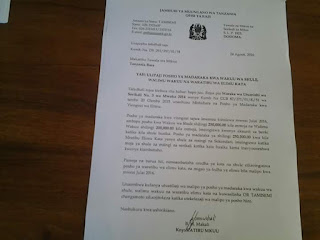THE SWEETNESS OF MP RACHEAL MASHISHANGA
THE SWEETNESS OF MP RACHEAL MASHISHANGA
MP RACHEL MASHISHANGA, special seats (CHADEMA)
Special Seats MP, Rahel Mashishanga (Chadema) has
called on the government to close a Shinyanga based
Chinese owned tannery for failure to pay building permit
and poor working environment.
The Chinese who acquired the premises over a year now
owe the municipal authority over Sh110 million in
building permit, according to the MP.
In addition, the investor, according to the legislator, has
failed to meet the required working and environmental
standards.
She said in her recent visit to the tannery she witnessed
workers handling wet skin and hides without cloves and
apron as per the requirements.
“This investor seems to be untouchable as no
government officials go there to inspect the tannery,
neither to ascertain if he meets the standards” she said.
The opposition politician wondered why the government
allows the so called investors who cannot afford to pay
building and business permit.
The investor has been on the spotlight for several cases
of violation of the law and smuggling of raw skin and
hides outside the country.
Tanzania loses billions of shillings in smuggling of raw
skin and hides prompting the government to engage
other security organs to check the trend.
Minister for Fisheries and Livestock Development, Titus
Kamani, recently stated that the government has engaged
all its security organs to investigate and book the
unscrupulous traders.
He said the Prevention and Combating of Corruption
Bureau (PCCB), police force and officials from the Ministry
of Livestock Development and Fisheries have been
engaged on the matter.
He added: “After collecting all the necessary details,
dishonest business people will be taken to court and
their licences revoked,” he said adding that the exercise
will be progressive aimed at uprooting raw and hides
smugglers.
Available sources show that the main cross border
outlets like Namanga, Mtukula and the Port of Dar es
Salaam are linked with the smuggling of raw hides and
skins.
For example, between 10 to 15 containers weekly going
at the tune of around 400,000 to 600,000 US dollars as
total value including 60 per cent government levies pass
through the Dar es Salaam port.
Tanzania has huge potential to become a giant exporter
of leather products and ultimately boost the sector’s
contribution to the national economy but with continued
smuggling, the goal will not be realised.
It is unconceivable for the country ranked third in the
continent with the largest livestock population but the
factories operate at under-capacity due to acute shortage
of raw materials, he said.
Available reports show that factories are operating below
capacity as two-thirds of the raw hides and skins are
illegally crossing borders, thus losing necessary
government revenues, premium returns to livestock
keepers and employment opportunities lost.
It is argued further that all high quality (tannery run)
leather products are being smuggled to neighbouring
countries leaving those of inferior value for the domestic
factories.
The materials for which domestic leather processing
plants get are of low grade five and six instead of the
highest grade of Tannery Run (TR). There are eight
leather processing plants with a total capacity of 73.9
million square feet, but it produces only 34.3 million
square feet which is equal to 46.4 per cent of the
installed capacity.
Statistics show that the government is collecting only 60
million US dollars annually from the leather sub sector,
but it could have gone to over 200 million US dollars per
annum should conducive business environment be
created.
The incidences of smuggling seem to be increasing due
to high prices offered in the neighbouring countries thus
creating acute shortage of raw materials for domestic
factories.
Low investments in value addition have denied the nation
earnings because nearly 90 per cent of exports are raw
hides and skin. Records show that skin and hides
exports earnings in recent years increased at an average
of around 22 per cent, indicating that the industry is
operating below capacity.
MP RACHEL MASHISHANGA, special seats (CHADEMA)
Special Seats MP, Rahel Mashishanga (Chadema) has
called on the government to close a Shinyanga based
Chinese owned tannery for failure to pay building permit
and poor working environment.
The Chinese who acquired the premises over a year now
owe the municipal authority over Sh110 million in
building permit, according to the MP.
In addition, the investor, according to the legislator, has
failed to meet the required working and environmental
standards.
She said in her recent visit to the tannery she witnessed
workers handling wet skin and hides without cloves and
apron as per the requirements.
“This investor seems to be untouchable as no
government officials go there to inspect the tannery,
neither to ascertain if he meets the standards” she said.
The opposition politician wondered why the government
allows the so called investors who cannot afford to pay
building and business permit.
The investor has been on the spotlight for several cases
of violation of the law and smuggling of raw skin and
hides outside the country.
Tanzania loses billions of shillings in smuggling of raw
skin and hides prompting the government to engage
other security organs to check the trend.
Minister for Fisheries and Livestock Development, Titus
Kamani, recently stated that the government has engaged
all its security organs to investigate and book the
unscrupulous traders.
He said the Prevention and Combating of Corruption
Bureau (PCCB), police force and officials from the Ministry
of Livestock Development and Fisheries have been
engaged on the matter.
He added: “After collecting all the necessary details,
dishonest business people will be taken to court and
their licences revoked,” he said adding that the exercise
will be progressive aimed at uprooting raw and hides
smugglers.
Available sources show that the main cross border
outlets like Namanga, Mtukula and the Port of Dar es
Salaam are linked with the smuggling of raw hides and
skins.
For example, between 10 to 15 containers weekly going
at the tune of around 400,000 to 600,000 US dollars as
total value including 60 per cent government levies pass
through the Dar es Salaam port.
Tanzania has huge potential to become a giant exporter
of leather products and ultimately boost the sector’s
contribution to the national economy but with continued
smuggling, the goal will not be realised.
It is unconceivable for the country ranked third in the
continent with the largest livestock population but the
factories operate at under-capacity due to acute shortage
of raw materials, he said.
Available reports show that factories are operating below
capacity as two-thirds of the raw hides and skins are
illegally crossing borders, thus losing necessary
government revenues, premium returns to livestock
keepers and employment opportunities lost.
It is argued further that all high quality (tannery run)
leather products are being smuggled to neighbouring
countries leaving those of inferior value for the domestic
factories.
The materials for which domestic leather processing
plants get are of low grade five and six instead of the
highest grade of Tannery Run (TR). There are eight
leather processing plants with a total capacity of 73.9
million square feet, but it produces only 34.3 million
square feet which is equal to 46.4 per cent of the
installed capacity.
Statistics show that the government is collecting only 60
million US dollars annually from the leather sub sector,
but it could have gone to over 200 million US dollars per
annum should conducive business environment be
created.
The incidences of smuggling seem to be increasing due
to high prices offered in the neighbouring countries thus
creating acute shortage of raw materials for domestic
factories.
Low investments in value addition have denied the nation
earnings because nearly 90 per cent of exports are raw
hides and skin. Records show that skin and hides
exports earnings in recent years increased at an average
of around 22 per cent, indicating that the industry is
operating below capacity.



Comments
Post a Comment